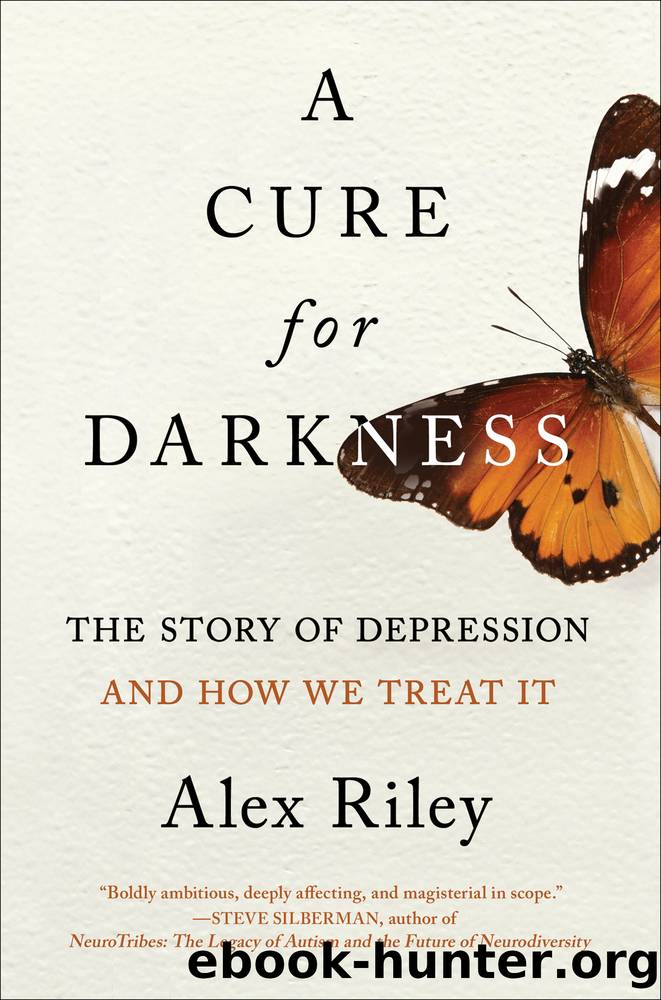A Cure for Darkness by Alex Riley

Author:Alex Riley
Language: eng
Format: epub
Publisher: Scribner
Published: 2021-04-13T00:00:00+00:00
Kufungisisa
Following in the footsteps of researchers in Uganda and Nigeria, the reality of depression in Zimbabwe was revealed a decade after it gained independence in 1980. Between 1991 and 1992, Melanie Abas, her husband and colleague, Jeremy Broadhead, and a team of local nurses and social workers visited two hundred households in Glen Norah, a low-income, high-density district in southern Harare. They contacted church leaders, housing officials, traditional healers, and other local organizations, gaining their trust and their permission to interview a large number of residents. They wanted to know whether depression even translated into the local Shona language. What if there was no word for depression? Could this be another reason why this so-called Western disease had been so neglected in sub-Saharan Africa? Through discussions with traditional healers and local health workers, her team found that kufungisisa, or âthinking too much,â was the most common descriptor for emotional distress. This is very similar to the English word rumination, which describes the negative thought patterns that often lie at the core of depression and anxiety. âAlthough all of the [socioeconomic] conditions were different,â Abas says, âI was seeing what I recognized as pretty classical depression.â
It wasnât just a case of thinking too much, however. There was also the lack of sleep and loss of appetite. A loss of interest in once enjoyable activities. And a deep sadness (kusuwisisa) that is different from a normal state of sadness (suwa). Using culturally appropriate terms such as kufungisisa to help identify mental suffering, Abas and her team found that depression was nearly twice as common in Harare as in a similar community in Camberwell, South London. In direct contrast to the previous surveys that found a rate of one in every four thousand (0.001 percent), Abasâs community surveys found that it was closer to one in every five people (20 percent).
As with the epidemiological studies in the U.S. and England, Abas wondered whether stressful life events were associated with depression in Harare. Even if the words were different, did the same social triggers transcend cultural and national boundaries? Adopting the methods of George Brown and Tirril Harris, famed sociologists who studied the relationship between life events and depression in Camberwell, she found a strong pattern emerge from her surveys. â[We found] that, actually, events of the same severity will produce the same rate of depression, whether you live in London or whether you live in Zimbabwe,â she says. âIt was just that, in Zimbabwe, there were a lot more of these events.â Poverty, malnutrition, unemployment, cholera, HIV: all took their toll. In particular, HIV and depression fit together into a tight spiral that slowly twists toward mortality. Not only are people who are HIV positive twice as likely to be depressed than an HIV-negative person, but the depression then makes the virus more lethal. The same is true for poverty: it is both a trigger for depression and made worse by being depressed.
These cyclic relationships were also an opportunity. Would treating the depression,
Download
This site does not store any files on its server. We only index and link to content provided by other sites. Please contact the content providers to delete copyright contents if any and email us, we'll remove relevant links or contents immediately.
Twisted Games: A Forbidden Royal Bodyguard Romance by Ana Huang(2523)
The Push by Ashley Audrain(2252)
Den of Vipers by K.A Knight(2179)
Win by Harlan Coben(2052)
Echo by Seven Rue(1875)
Leave the World Behind by Rumaan Alam(1709)
Beautiful World, Where Are You: A Novel by Sally Rooney(1614)
Midnight Mass by Sierra Simone(1575)
Iron Widow by Xiran Jay Zhao(1471)
The Four Winds by Hannah Kristin(1457)
Baby Bird by Seven Rue(1415)
The Warrior's Princess Prize by Carol Townend(1402)
Undercover Threat by Sharon Dunn(1401)
Bridgertons 2.5: The Viscount Who Loved Me [Epilogue] by Julia Quinn(1393)
Sister Fidelma 07 - The Monk Who Vanished by Peter Tremayne(1340)
Snowflakes by Ruth Ware(1233)
Vanessa Yu's Magical Paris Tea Shop by Roselle Lim(1215)
The Golden Cage by Camilla Lackberg(1185)
The Midwife Murders by James Patterson(1147)
